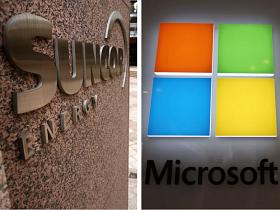Suncor deal with Microsoft for digital transformation first for the oilsands
CALGARY – Suncor Energy Inc. is partnering with high-tech giant Microsoft Corp. to harness the power of cloud computing, big data and machine learning in a deal that is being called a first for the oilsands industry.
Suncor and Microsoft will work together on projects over the next several years aimed at transforming the energy giant’s retail fuel network of Petro-Canada stations, tracking data collected at its oilsands projects and changing how people work at the Calgary-based company’s headquarters.
“It’s certainly our first partnership of this kind in Western Canada,” Sarah Kennedy, Microsoft’s director enterprise for Western Canada said, adding the deal includes agreements covering Microsoft’s “three clouds,” which are its Azure service, Dynamics 365 enterprise computing and Office 365 software suite.
Kennedy said Microsoft has previously worked on projects in the Canadian energy industry, but the “strategic alliance” with Suncor is a first in terms of its scale in the oilsands as Suncor is looking to make major changes.
The Canadian oilsands industry has invested billions of dollars trying to find innovative environmental technologies to reduce its carbon footprint. Despite its readiness to adapt to new clean-tech products, the domestic oil and gas business has been relatively slow until very recently to adopt new digital technologies such as machine learning.
“Although we are an industry leader in many respects, we still have much to learn in the digital space, which is why we’re working with a number of organizations including Microsoft to challenge us,” Suncor chief executive Mark Little said in a release announcing the multi-year partnership with Microsoft.
The work with Microsoft is part of an initiative Little has previously discussed called “Suncor 4.0,” meant to mark the company’s fourth major transformation.
The first was the establishment of the company’s first oilsands mine in 1967, followed by the implementation of new technology in the mine that enabled the oilsands to grow in the early 1990s, and then its merger with Petro-Canada in 2010.
Suncor 4.0 is meant to mark a digital age for the company, but it has already implemented some new technologies at its oilsands business. For example, it was the first to announce a move toward fully autonomous trucks at its oilsands mines.
Employees at Suncor’s oilsands upgraders, Fort Hills oilsands mine and Firebag steam-based oilsands project also wear wireless badges while they work, allowing the company to track and analyze frontline maintenance work with the goal of improving safety and productivity.
Now, through the partnership with Microsoft, Suncor will be able to bring all the data it collects into the cloud where it will be subject to new analyses and augmented with artificial intelligence and machine learning, Suncor senior vice-president, digital and enterprise technology, Sandy Martin said.
The partnership with Microsoft will also allow Suncor to revamp and streamline many aspects of how the company runs its Petro-Canada stations, including the back-end inventory management of its stores and, potentially, even the customer experience of filling up their cars.
Martin said the digitization of Suncor’s systems is one way the company is trying to achieve its previously stated goal of generating an additional $2 billion in incremental cash flow by 2023.





